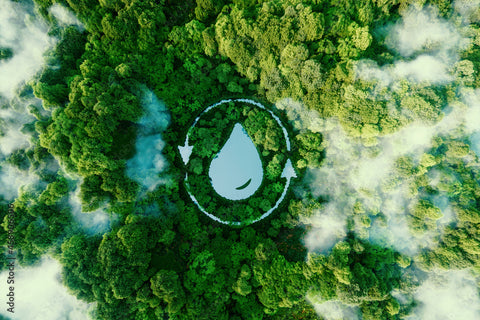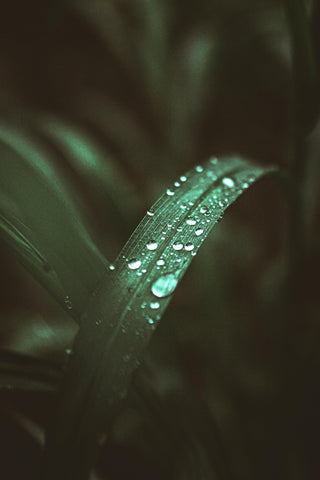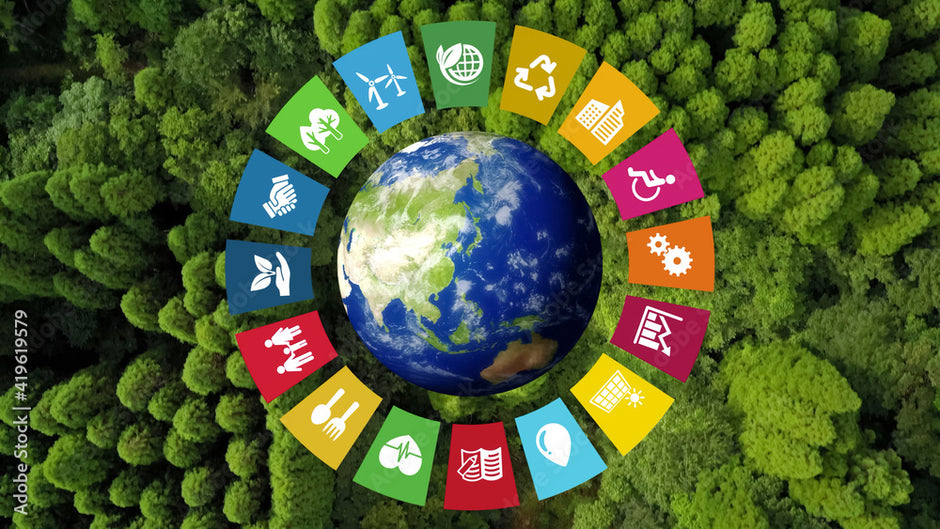Water conservation can be done in many ways. At Bamboi, you save water with bamboo toilet paper.
Water conservation is the careful use and preservation of water supplies, with understanding of the impact of using water quantity and quality. Due to population growth, water supplies worldwide have come under pressure. Neglect of existing water supplies such as water reservoirs, lakes, and poor maintenance of water surface systems have contributed to this problem.
Water conservation has become essential in every part of the world, even in regions where there seems to be enough water. Take the Netherlands, for example. Although we are surrounded by water and it symbolizes shipping and prosperity in our country, the cabinet recently decided that before 2035 water consumption in the Netherlands must be reduced by as much as 20 percent. Due to intensive use and climate change, it is also necessary here to save water.
Water is essential for all living organisms on Earth. Water is also needed for various activities, from local use to the agricultural industry. Water conservation starts with yourself and is a necessary task that must be carried out by everyone in society.
There are various ways to contribute, for example by buying water-saving products, such as a water-saving toilet or bamboo Bamboi toilet paper. Below explains why saving water is so important and how you can save water at home.

How can you save water?
Saving water is necessary because water is one of the most important and primary necessities of life for humans and all other living organisms. It is necessary to minimize water waste and ensure there is enough water for everyone. Water conservation is also needed to combat climate change. Using less water automatically puts less pressure on water treatment plants, which use a lot of energy to supply water. The importance of water conservation therefore cannot be emphasized enough. There are various ways to save water. Later in this article, tips for saving water are discussed, and several water-saving products are covered.
Why save water?
Although 71 percent of the Earth consists of water, it is still necessary to save water. 97 percent of all water on Earth is salt water, which is not suitable for drinking. Only three percent of the water on Earth is fresh water, and only 0.5 percent is available for drinking. The remaining 2.5 percent of fresh water is locked in ice caps, glaciers, the atmosphere, soil, or below the Earth's surface. Much of the water on Earth is also too polluted for consumption.
Because the number of people walking around on Earth is growing and only a small percentage of the water on Earth is suitable for use, we need to be conscious of our water consumption and save (drinking) water where possible.
In other words, water conservation is not a task left to scientists, urban planners, or wildlife managers. It is a task we all must accomplish if we want to preserve the Earth. Below are the main reasons to save water.
Water conservation minimizes the effect of drought and water shortages
Although our need for fresh water sources will always increase due to population growth and industry growth, the water supply will remain constant. While water eventually returns to Earth through the well-known water cycle, it doesn't always come back in the same place, or in the same quantity and quality. By reducing the amount of water we use, we can better protect ourselves against future drought years.
Water conservation protects against rising costs and political conflicts
If we fail to save water, it could eventually lead to a lack of sufficient water. This potentially has drastic consequences such as rising costs, reduced food supplies, health risks, and political conflicts.
Water conservation helps protect the environment
Reducing our water use reduces the energy needed to process and deliver it to homes, businesses, farms, and communities. This in turn helps reduce pollution and save fuel sources.
Water conservation makes water available for recreational purposes
Recreational purposes should not only be thought of as swimming pools, spas, and golf courses. Many of our freshwater sources are also used to make the environment a bit more beautiful: for example, to water lawns, trees, flowers, and vegetable gardens, but also to wash cars and fill public fountains in parks. If we fail to save water now, it could mean there isn't enough water for these recreational purposes.
Water is essential for building and maintaining public facilities and services
Firefighters, hospitals, gas stations, street sweepers, gyms, and restaurants all need large amounts of water to provide services to society. By reducing our water consumption now, these services can still be provided in the future.
Water conservation thus means minimizing our water use and carefully managing the supplies we have. Because every living organism in the world depends on water to stay alive, it is our responsibility to learn more about water conservation and how we can help ourselves and future generations maintain sufficient supplies of this life necessity. Therefore, here are some tips to save water. These simple tips for water conservation in daily life can help effectively combat water shortage.

Saving water at home
As emphasized earlier in this article, water conservation is vital and something we as a society are responsible for. No government or institution can help save water unless we also contribute ourselves. Water conservation thus starts with yourself, for example by saving water at home. Reducing water consumption reduces the energy needed to process and deliver it to homes, businesses, farms, and communities. This in turn helps reduce pollution and save fuel sources.
By preventing water waste, we can maintain society. Additionally, protecting our natural ecosystems from further damage is crucial, especially for the survival of endangered species, for example. The pacific garbage patch is a good example of the worst side of our wasteful practices. There are many ways to save water in and around your home. Some options include, for example, making sure the kitchen faucet doesn't leak and turning it off when you're not using it. This naturally applies to the shower and the rest of the house as well.
Another option to save water is buying a water-saving product that uses less water without having to compromise on comfort. Examples of water-saving products include water-saving toilets, showers, or faucets. Using bamboo toilet paper compared to other products like recycled toilet paper can also contribute to water conservation.
Recycled toilet paper is made from old paper products such as receipts and packaging. The advantage of this is that old paper gets a new purpose. A major disadvantage of recycling paper is that a lot of water and chemicals are needed to clean old paper. These chemicals can be very harmful to both nature and the user. When recycled paper ends up in the ground or in water, it causes damage to the environment.
Bamboi toilet paper is unbleached, free from added chemicals, and therefore a 100% organic product. An organic product is biodegradable. This means it can decompose in nature without damaging it with chemicals. The use of water to produce recycled paper varies by manufacturer but ranges between 2.5 to 75 liters of water per roll. The water consumption to produce a roll of Bamboi bamboo toilet paper is 1.75 liters per roll. From this, it can be concluded that bamboo toilet paper helps save water. In this article, we go deeper into the production process of Bamboi bamboo toilet paper.
Does bamboo need a lot of water?
The amount of water a bamboo plant needs depends on its environment and what purposes it is used for. Generally, outdoor bamboo needs less water than indoor bamboo. Where in the case of outdoor bamboo nature helps a great deal with the water regulation system, indoor bamboo logically needs more attention. Indoor bamboo needs a lot of water and must be watered every other day, otherwise the bamboo leaves will wither. It's important to know that the leaves are always shed in winter, this is a natural process in preparation for the winter season. Bamboo care thus depends on the location of the plant.
Water conservation requires forethought and effort, but every little bit helps. Don't think that what you do doesn't matter. We can all make changes in our lifestyle to reduce our water consumption. The trick is just to make water conservation a way of life - not just something we think about occasionally. A first step in the right direction is, for example, using water-saving products. A solution for this is using Bamboi bamboo toilet paper. Order our toilet rolls on the website in our webshop! Or read more about our toilet paper subscription.





































